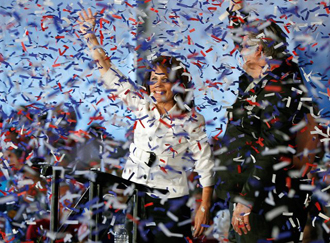Last week’s Iowa Straw Poll in Ames is a good illustration of how our democratic system works and doesn’t work, and why much of the actual influence it exerted has been replaced by the internet.
Michele Bachmann won the polling with 4,823 (28.6%) of the total 16,892 votes cast. Based on those paltry numbers Minnesota governor Tim Pawlenty, who got 2,293 votes, pulled out of the race. Meanwhile, Ron Paul, who is generally seen as having zero chance of winning an actual presidential election, won 4,671 votes to come in second. Rick Perry, who hadn’t yet declared his candidacy but may have some small chance, had 718 write-in votes.
Based on these results and conventional wisdom the media anointed Bachmann and Perry as front-runners to become the eventual GOP pick. And of course that will now be taken as gospel by many of those considering whether to support one of the other candidates, adding to the snowball effect around that paltry core of 16,892 angry rural voters.
Mitt Romney and Jon Huntsman got only 567 and 69 votes, respectively, and are being written off by pundits though they are the most likely to have a fighting (albeit very slim) chance against Barack Obama in an actual presidential election.
Of course Bachman — who has zero chance against Obama — is likely to take on increasing stature through the first four primaries which will take place between February 6 and 28, 2012, with a likely setback in New Hampshire on the 14th though Sarah Palin could upset her apple cart by entering the race and leaching away her Tea Party support.
In decades past candidates like Perry, Romney and Huntsman — who know they would do better than Bachman in the bigger winner-take-all states and have the ability to raise money there — would stay in the race. But now that the internet has become the surrogate for our traditional democratic process, they already face pressure to pull out. Those Tea Partisans are passionate and have a lot of time on their hands to squat and troll internet forums with their rants about taking America back. From whom and how many centuries back? It’s hard to tell, but they’re determined to make it happen.
And there’s little to stop them given the usual low primary turnouts of about 10 – 20% in states like Iowa, Nevada and S. Carolina, though it’s usually around 50% in New Hampshire. The most rabid and least reasonable people are generally doing the choosing of their party’s candidates.
The internet may actually engender a presidential race between Bachman and Obama. It’s pretty clear to me and most other reasonable people as to who would win that race, but that’s beside the point. My point is that our democratic system — short-circuited by the internet and corrupted by the mass media’s focus on sensationalistic candidates and causes — is often more of a circus for our amusement and distraction than an opportunity for well-informed citizens to choose among the best qualified candidates.
Our democratic system took a serious hit with the debt-ceiling fracas which made China’s one-party system — which engineered three decades of double-digit growth — look like the more highly evolved system. Our next presidential election isn’t likely to do much for the image of American democracy either, what with the Tea Party learning rapidly how to leverage the internet to put their far-right obsessions center stage in the American debate.

